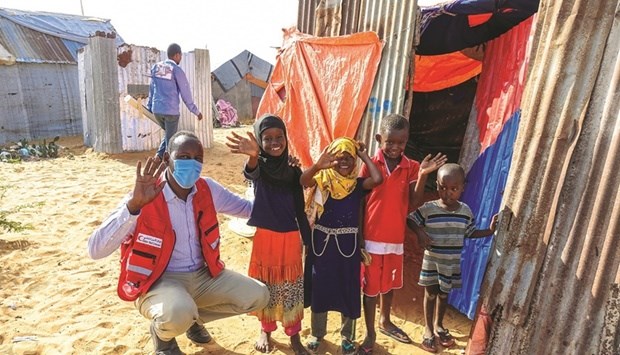
Tuesday August 23, 2022

The purpose of the project is to meet the priority needs of drought-affected IDPs by providing primary healthcare, clean drinking water and public health awareness.
Qatar Red Crescent Society (QRCS) has launched an emergency response to drought in Somalia, with a set of food, health, water and sanitation assistance for the benefit of 25,423 internally displaced persons (IPDs) at the camps of Dolow district, Gedo region, Jubaland, as well as 162,000 heads of livestock, at a total cost of $500,000 (QR1,822,500).
The purpose of the project is to meet the priority needs of drought-affected IDPs by providing primary healthcare, clean drinking water and public health awareness. These activities will ensure better hygiene, reduce waterborne diseases and minimise malnutrition rates among children, pregnant women and older persons.
According to the plan, the following activities will be carried out:1. Water and Sanitation: provision of potable water for three months, totaling 270 20-litre water tanks, to be used for drinking purposes for 4,000 people and 162,000 heads of livestock, as well as the distribution of 850 hygiene kits containing soap, hand sanitisers, detergents and jerrycans.
2. Healthcare: deployment of a mobile clinic for three months to provide primary healthcare services (such as clinical examinations, laboratory tests, minor surgeries and medications) and hold health education sessions, for the benefit of 5,400 people.
3. Food Security: a total of 2,289 food parcels will be distributed to 16,023 people, each containing 94.5kg of food staples such as flour, rice, sugar, vegetable oil, infant formula and dates.
Prior to the project, there was co-ordination with the competent authorities in Somalia to identify the beneficiaries and outline the mechanisms of implementation. The project is being carried out in partnership with Somalia’s Ministry of Health (MoH), Ministry of Humanitarian Affairs and Disaster Management (MoHADM), Somali Red Crescent Society (SRCS) and camp management committees in Jubaland.
The drought disaster in Somalia has recently worsened, exposing more than 6.1mn people to the risks of food insecurity, water scarcity and malnutrition, up from 3.2mn in December 2021, according to humanitarian organisations in Somalia.
The southern provinces are the hardest hit by the drought, which has killed more than 34,000 heads of livestock and threatens millions of lives in Lower and Middle Juba, Gedo, Galgaduud and Mudug regions of Jubaland and Galmudug.
According to MoHADM, some 10.7mn are experiencing severe humanitarian conditions due to drought, desert locusts and unstable rainfall, in addition to the impact of Covid-19, which has weighed heavily on the country’s economy and food prices.